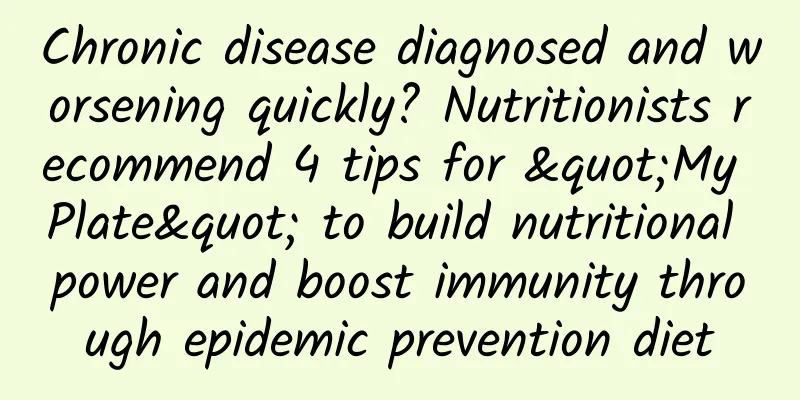Chronic disease diagnosed and worsening quickly? Nutritionists recommend 4 tips for "My Plate" to build nutritional power and boost immunity through epidemic prevention diet

|
Adequate nutrition and hydration are crucial during the COVID-19 outbreak! Most of the confirmed deaths from the domestic COVID-19 epidemic had chronic diseases, cardiovascular problems, and were older, with poor immunity. When exposed to the virus, they were more easily invaded into their bodies. In just two days, they developed uncontrollable symptoms such as fever, cough, and difficulty breathing, causing a vicious cycle of loss of appetite and less and less nutrition for the body. Nutritionists especially recommend "My Plate" to teach the public to maintain a balanced diet, build their own health, build nutritional strength, and enhance immunity! Nutritionist You Weiming shared 4 tips: food diversity, eat the six major foods every day; ingredients should be natural, delicious, fresh and nutritious; high-quality protein, with beans, fish, eggs and meat in every meal; enough dietary fiber to promote intestinal health. Help people maintain a balanced diet and build their own healthy immunity during the outbreak of the new coronavirus! (Photo provided by nutritionist You Weiming) People who eat a balanced diet with a variety of nutrients tend to be healthier, have stronger mucous membranes and immune systems, and have a lower risk of viral infection. Therefore, nutritionist You Weiming from the Catholic St. Martin's Hospital recommends that people should eat a variety of fresh, natural and less processed foods every day (for example: fruits and vegetables, soy products, seafood, meat and eggs, whole grains, nuts, etc.) to obtain the various nutrients and antioxidants needed by the body from these foods. At the same time, drink enough water and avoid foods with added sugar, fried foods, high-salt and overly seasoned foods (for example: instant noodles, fried chicken, spicy hot pot, high-salt canned foods, shacha sauce, etc.). Always keep your body nourished enough to fight against the outbreak of the new coronavirus. Four tips for "My Plate": Food diversity, natural ingredients, high-quality protein, and enough dietary fiber The National Health Administration of the Ministry of Health and Welfare launched My Plate ● Eat smart ● Get nutrition! It makes it easier for people to understand how to achieve a healthy diet, provides people with a healthy lifestyle with a balanced diet, and allows them to eat healthy and nutritious food at home in their daily lives. (My Plate https://healthydiet.hpa.gov.tw/meals.html) Nutritionist You Weiming from Catholic St. Martin's Hospital shared 4 tips: Food diversity, eat the six major foods every day; ingredients should be natural, delicious, fresh and nutritious; high-quality protein, with beans, fish, eggs and meat in every meal; enough dietary fiber to promote intestinal health. Help people maintain a balanced diet and build their own healthy immunity during the outbreak of the new coronavirus! My Healthy Plate. (Photo provided by nutritionist You Weiming) Nutritionist You Weiming demonstrates a balanced and healthy dumpling menu below: Dumplings are a balanced, nutritious and healthy eating menu. (Photo provided by nutritionist You Weiming) Nutritionist You Weiming said that the World Health Organization (WHO) recently issued five recommendations on diet and nutrition during the outbreak of the new coronavirus: Eat fresh and unprocessed foods every day Eat vegetables and moderate amounts of fruit (2-4 servings per day/about 1 flat bowl per serving), legumes (e.g. lentils, beans), moderate amounts of nuts (1-2 servings per day/about 1 tablespoon per serving), and whole grains (e.g. brown rice, pumpkin, potato, taro, yam, unprocessed corn, millet, oats, etc.) and high-quality protein sources (soy products, seafood, meat, eggs, dairy products). For snacks or treats, choose fresh fruit that's in season instead of options high in sugar, fat, or salt. Drink enough water every day Water is essential to life. Water transports nutrients in the blood, regulates body temperature, transports metabolic waste products, and lubricates and cushions joints. People are encouraged to drink 8-10 glasses of water (about 240cc per glass) every day. Water is the best choice, but you can also consume other water-containing beverages, such as: sugar-free freshly squeezed fruit and vegetable juice, 1 pot of water with 1 lemon slice, sugar-free tea and coffee (be careful not to consume too much caffeine), and be sure to avoid sweet syrups, concentrated juices, carbonated drinks and sugary drinks. Eat the right amount of fat Choose foods with unsaturated fats (for example, seafood, avocados, nuts, olive oil, soybean oil, camellia oil, etc.) and avoid saturated fats (for example, fatty meat, chicken skin, offal, ghee, butter, etc.). It is recommended to choose meat with low fat content (fish, poultry) and avoid processed meat with high fat and salt content. When possible, choose low-fat milk and dairy products, and avoid processed foods containing trans fats, such as snack foods, fried foods, frozen pizza, margarines and fatty spreads. Eat less salt and sugar When cooking and preparing food at home, avoid excessive salt and high-sodium condiments (soy sauce and fish sauce). For patients with cardiovascular disease, limit salt intake to less than 6 grams per day and use iodized salt. Avoid snacks high in salt and sugar, avoid soda and other drinks high in sugar (for example: fruit juice, concentrated juice and syrup, flavored milk and lactic acid drinks), and choose moderate amounts of seasonal fresh fruits instead of sweet snacks such as biscuits, cakes and chocolates. Avoid eating out Eating at home reduces your contact with other people and reduces your chances of contracting COVID-19. Please wear a mask when you need to go out, and it is recommended that you keep at least 1 meter away from anyone who is coughing or sneezing. Avoid dining in crowded social environments such as restaurants and coffee shops. Droplets from infected people may spread quickly in crowded environments and land on tableware, tables, and people's (e.g., customers and employees) hands or bodies. We should wash our hands frequently to avoid the chain of virus transmission. |
Recommend
Pelvic inflammatory disease has many causes and treatment needs to be early
Pelvic inflammatory disease is a common gynecolog...
Why do women have vulvar itching?
Vulvar itching in women may be related to vaginal...
Skipping rope not only enhances cardiopulmonary function, but also helps reduce weight and burn fat!
Skipping rope is a simple and easy exercise that ...
What should I do if my period hasn’t come for more than three months at the age of 42?
What should I do if my period hasn’t come for mor...
Detailed description of the harmful manifestations of cervical hypertrophy
Among gynecological diseases, cervical hypertroph...
What symptoms will women experience if they have irregular menstruation?
Irregular menstruation is a common gynecological ...
"Poultry Sales Network" easily places orders for safe poultry meat delivery to your home
In order to allow the public to taste qualified a...
What are the symptoms of uterine fibroids? How to diagnose uterine fibroids?
Women in menopause must pay attention, because at...
What are the symptoms of menopause?
Menopause is medically known as amenorrhea. Ameno...
Symptoms of pelvic inflammatory disease
Symptoms of pelvic inflammatory disease: Not all ...
Why do uterine fibroids sometimes disappear?
Why do uterine fibroids sometimes disappear? Uter...
What are the treatments for threatened abortion?
Threatened abortion is a very common condition fo...
Irregular menstruation needs prompt treatment
Abnormal menstrual cycle or bleeding volume are s...
There are several ways to check for threatened abortion
Threatened abortion is a relatively dangerous sit...
Hospitalization costs for patients with threatened abortion
Many pregnant mothers have threatened miscarriage...









